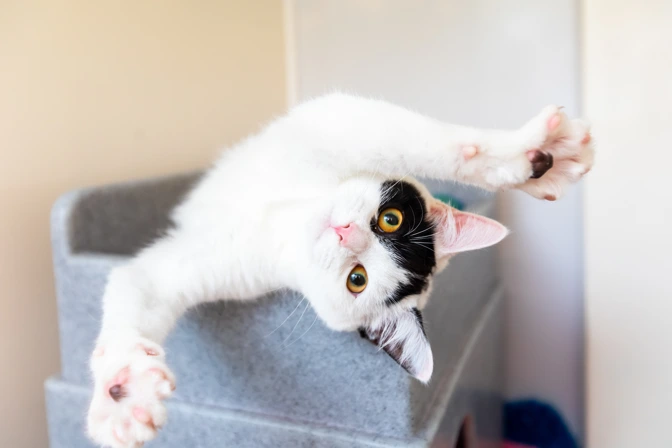The benefit of happy tenants is obvious: they’re more likely to stay for longer and value the home they’re renting. You can help tenants feel more at home in your property by offering your property as cat-friendly. By following a few simple steps, you can remain in control and ensure tenants are responsible cat owners.
As a landlord, you may have concerns that a cat will damage fixtures and fittings. The reality is that cats rarely cause any issues. 75% of cat-friendly private landlords report no problems at all from cats in their properties***.
Download our example pet clauses to see how pets can be allowed in a rental property, and how you can encourage responsible cat ownership.
Our suggested clauses clearly set out conditions of cat ownership to ensure tenants have their cats neutered, microchipped, vaccinated and treated for fleas and other parasites. Not only is this good for the cat’s welfare, it also reduces the risk of any issues arising.

The first step is to advertise your property as ‘pets welcome’. This will ensure you can make your decision once you’ve met your potential tenant and know more about their cat. Letting people know you’re willing to rent your property to those who already have cats is a great way to open up a wider pool of potential tenants but keeps you firmly in control.

Lynton is a private landlord based in Warrington. Lynton currently rents a properly to a private tenant who owns a cat by permission.
I want to keep the tenant as long as I can and keep them happy, because a happy tenant is a happy landlord.
Cats make fantastic pets and can thrive in many types of homes. From cosy flats to houses with gardens, the right match depends on the individual cat’s personality and needs
.
While many cats will enjoy having access to the great outdoors, others may be better suited to indoor living, making them ideal for flats or homes without gardens.
Cats who are blind, deaf or have some other disability may be best kept as indoor cats, while other cats with certain illnesses can lead happy, contented lives indoors.

Need to talk? We're always happy to help.
Cats Protection National Info Line - 03000 12 12 12 Mon-Fri, 9am - 5pm
Cats Protection Neutering helpline - 03000 12 12 12 Mon-Fri, 9.30am to 1pm
*https://assets.publishing.service.gov.uk/government/uploads/system/uploads/attachment_data/file/609282/Dwelling_Stock_Estimates_2016_England.pdf http://www.gov.scot/Topics/Statistics/Browse/Housing-Regeneration/HSfS/KeyInfoTables, http://gov.wales/docs/statistics/2017/170427-dwelling-stock-estimates-2015-16-en.pdf, https://www.bva.co.uk/about-us/our-structure/animal-welfare-foundation/
** and *** All figures, unless otherwise stated, are from YouGov Plc. Total sample size for the survey of private landlords was 985. Fieldwork was undertaken between 16-27 January 2018. The survey was carried out online. The figures have been weighted and are representative of private landlords. The total sample size for the survey of private renters was 1378. Fieldwork was undertaken between 9 - 27 November 2017. The survey was carried out online. The figures have been weighted and are representative of private renters in the UK (aged 16+).